|
|
|
Sort Order |
|
|
|
Items / Page
|
|
|
|
|
|
|
| Srl | Item |
| 1 |
ID:
175536
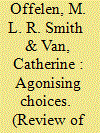

|
|
|
|
|
| Summary/Abstract |
Tragedy is one of the oldest metaphorical lenses of International Relations. The tragic vision of politics, from Thucydides to contemporary realist theorists, lies at the core of classical realism. However, it is striking how rarely the concept of tragedy has been applied to the discourse of humanitarian intervention. This lacuna is a weakness on both the intellectual and political levels, as nowhere are clashes between competing ethical perspectives more glaring. An examination of the concept of tragedy, as conceived from its Greek origins, can illuminate an understanding of the morally contradictory imperatives created by armed intervention. Using the Bosnian War as a case study, Greek classical tragedy provides a framework to grasp the agonising choices and insoluble ethical dilemmas brought about by humanitarian intervention, in contrast to mere narratives of salvation. The argument conveyed in this article seeks to reconcile a tragic vision with the idea of progress and political action. It concludes by suggesting that the fundamental lessons that lie at the heart of tragedy should be associated with another major concept in Greek culture, namely, the Aristotelian idea of phronesis or ‘practical wisdom’.
|
|
|
|
|
|
|
|
|
|
|
|
|
|
|
|
| 2 |
ID:
047109
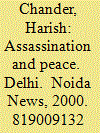

|
|
|
|
|
| Publication |
DelhI, Noida News, 2000.
|
| Description |
195p.
|
| Standard Number |
819009132
|
|
|
|
|
|
|
|
|
|
|
|
Copies: C:1/I:0,R:0,Q:0
Circulation
| Accession# | Call# | Current Location | Status | Policy | Location |
| 044355 | 305.80095493/CHA 044355 | Main | On Shelf | General | |
|
|
|
|
| 3 |
ID:
089262
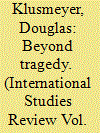

|
|
|
|
|
| Publication |
2009.
|
| Summary/Abstract |
Hans Morgenthau claimed that a tragic perspective enables us to confront more squarely the harsh realities of politics, the evil aspects of human nature, and the ethical compromises action requires. Richard Lebow has more recently identified Morgenthau as an exemplar in making his own case for the "tragic vision." This essay contrasts the sharp differences between Morgenthau's and Hannah Arendt's response to the Holocaust to challenge Morgenthau's claim, and to illustrate the limitations of a tragic perspective. Her turn to law in confronting the problems of evil and responsibility that the Holocaust had so radically posed underscores the need to draw upon other conceptual resources beyond tragedy in our critical engagement with such issues.
|
|
|
|
|
|
|
|
|
|
|
|
|
|
|
|
| 4 |
ID:
133867
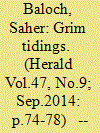

|
|
|
|
|
| Publication |
2014.
|
| Summary/Abstract |
Could the Karachi beach tragedy have been averted? For now the beach at Seaview is empty. Most people who do show up from time to time either sit far away from the water, near the concrete footpath, or inside their cars, watching the waves crash onto the sandy shore. At every mile, a policeman promptly stops anyone trying to go towards the water.
|
|
|
|
|
|
|
|
|
|
|
|
|
|
|
|
| 5 |
ID:
187029
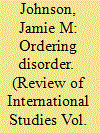

|
|
|
|
|
| Summary/Abstract |
This article offers insights into the character and composition of world order. It does so by focusing on how world order is made and revealed through seemingly disorderly events. We examine how societies struggle to interpret and respond to disorderly events through three modes of treatment: tragedy, crisis, and scandal. These, we argue, are the dominant modes of treatment in world politics, through which an account of disorder is articulated and particular political responses are mobilised. Specifically, we argue that each mode provides a particular way of problematising disorder, locating responsibility, and generating political responses. As we will demonstrate, these modes instigate the ordering of disorder, but they also agitate and reveal the contours of order itself. We argue, therefore, that an attentiveness to how we make sense of and respond to disorder offers the discipline new opportunities for interrogating the underlying forces, dynamics, and structures that define contemporary world politics.
|
|
|
|
|
|
|
|
|
|
|
|
|
|
|
|
| 6 |
ID:
125312
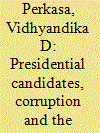

|
|
|
|
|
| Publication |
2013.
|
| Summary/Abstract |
The Dynamic of Indonesian politics have intensified in the anticipation of the largest dance of democracy on 2014: the legislative and presidential elections. The public` entertained' by how boisterous the big political parties are in announcing their presidential candidate ; such as Partai Golongan Karya/ Golkar with Aburizal Bakrie, Great Indonesia Movement Party (Partai Gerakan Inonesia Raya/ Gerindra) with Prabowo Subianto, People`s Conscience Party (Partai Hati Nurani Rakyat/ Hanura) with Wiranto, National Mandate Party (Partai Amanat Nasional/ PAN) with Hatta Rajasa, and United development Party (Partai Persatuan Pembangunan/ PPP) With Suryadharma Ali.
|
|
|
|
|
|
|
|
|
|
|
|
|
|
|
|
| 7 |
ID:
133240
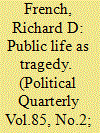

|
|
|
|
|
| Publication |
2014.
|
| Summary/Abstract |
Some of the most perceptive observers of public life have emphasised its tragic dimensions, not so much out of sympathy for politicians, but because the lens of tragedy offers a unique insight into the realities of the world of politics. Here I attempt to synthesise this tragic perspective by employing the comments of those best positioned to identify the salient features of public life, its primary dramatis personae. Politics occasionally provides us with the kind of spectacular catastrophe that journalists like to construe as tragedy. But our purpose is to evoke a different, more personal, less visible kind of tragedy: the small but malignant tragedies of self-betrayal, of inflation of the ego and deflation of conscience, of helpless witness to injustice and misfortune, of status unaccompanied by power or efficacy, of the shrinking of aspiration to the scale of the practicable, of disillusion and, on occasion, of despair.
|
|
|
|
|
|
|
|
|
|
|
|
|
|
|
|
| 8 |
ID:
130021
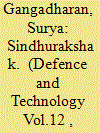

|
|
|
| 9 |
ID:
186553
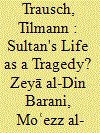

|
|
|
|
|
| Summary/Abstract |
This article examines how Zeyā al-Din Barani may have imagined that contemporary audiences would consume his Tārikh-e Firuz Shāhi. Would it only be read visually or also read aloud (directed at the ear rather than the eye), and thus be received aurally, or would it even be performed in front of a larger audience? The plot and protagonists of Barani's story on Moʿezz al-Din Keyqobād present a tragedy that develops around a sultan doomed to fail. An examination of the set-up of Barani's narrative reveals that it contains numerous textual devices that would enable a storyteller to perform the story, using the text as a kind of tumār. As tragedies are written for the stage, not the study, these features of the text indicate that matters of orality, which are crucial for many genres of premodern Persianate courtly literature, are also relevant to the Tārikh-e Firuz Shāhi.
|
|
|
|
|
|
|
|
|
|
|
|
|
|
|
|
| 10 |
ID:
084952
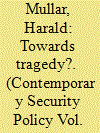

|
|
|
| 11 |
ID:
127013


|
|
|
|
|
| Publication |
2013.
|
| Summary/Abstract |
This article examines and critiques the binary structure of contemporary just war thinking. Theorists claim that the waging of war, and the committing of military acts within war, is either just or unjust. This binary distinction should be tempered by the awareness that justified wars are tragic: tragic in the broad sense of inescapably involving moral wronging, but not necessarily tragic in the narrow sense of not having been preventable by the tragic agent himself or herself. Justified war situations that fail to be tragic in the narrow sense are inauthentic. If contemporary just war theorists were to explicitly recognise the tragedy of justified war in the broad sense, as well as the dangers of lacking authenticity, their theory might become less susceptible to abuse by political moralists.
|
|
|
|
|
|
|
|
|
|
|
|
|
|
|
|
| 12 |
ID:
077210
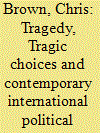

|
|
|
|
|
| Publication |
2007.
|
| Summary/Abstract |
The essence of the tragic vision of the world is that human action sometimes, perhaps often, involves a choice between two radically incompatible but equally undesirable outcomes: that whatever we do in a given situation we will be, from one perspective, acting wrongly. This account of the human condition may be particularly germane to realist thought, but the absence of a sense of the tragic can be employed to critique many other areas of international political theory. Analytical political theory in general rejects the tragic vision, and a great deal of modern writing on humanitarian intervention and global distributive justice similarly refuses to accept that sometimes there are no unambiguously right answers; that to act is, necessarily, to do wrong. The unwillingness to admit the tragic dimension of human existence is not simply intellectually harmful but also politically debilitating
|
|
|
|
|
|
|
|
|
|
|
|
|
|
|
|
| 13 |
ID:
128731
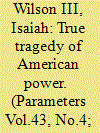

|
|
|
|
|
| Publication |
2013-14.
|
| Summary/Abstract |
American distaste for tragedy has led us strategies and policymakers mere force for power. Understanding the difference between force and power is vital to america rise as a durable and balanced global power, and not merely as a forceful hegemon. This understanding is all the more imperative at a time of compounding global security and austerity.
|
|
|
|
|
|
|
|
|
|
|
|
|
|
|
|
| 14 |
ID:
122559
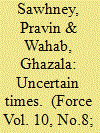

|
|
|
|
|
|
|
|